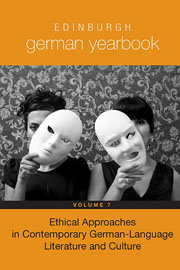 Edinburgh German Yearbook 7
Edinburgh German Yearbook 7 Published online by Cambridge University Press: 05 December 2013
“Memory contests” are a defining feature of contemporary German cultural and political life. As Anne Fuchs and Mary Cosgrove explain, the term denotes “highly dynamic public engagements with the past,” which in the German context constitutes “hotly contested territory.” While the now well-established notion was developed in response to framings of the national socialist past, it can also be applied to ongoing attempts to articulate and account for the east German experience. This chapter engages in such an application, with the complementary aim of bringing to light the ethical implications of these memory contests. “ethics,” here, connotes a relationship of obligation to “the other.” The chapter asks: what is at stake, ethically, in writings of the GDR past? How do such writings fit into, or indeed challenge, the “continuing struggle to imagine Germany as a unified, democratic, and capitalist country”? And what do they tell us more broadly about the relationship between ethics and memory?
This project involves an examination of four recent German novels in which the memory of life in the GDR plays an important role: Julia Schoch's Mit der Geschwindigkeit des Sommers (2009), Stefan Moster's Die Unmöglichkeit des vierhändigen Spiels (2009), Antje Rávic Strubel's Sturz der Tage in die Nacht (2011), and Judith Schalanksy's Der Hals der Giraffe (2011). In all of these works, the memory of the GDR is mediated and explored through the depiction of difficult, even taboo, familial or quasi-familial relationships. In all the texts, shame—“an intense and painful sensation that is bound up with how the self feels about itself”— features significantly.
To save this book to your Kindle, first ensure [email protected] is added to your Approved Personal Document E-mail List under your Personal Document Settings on the Manage Your Content and Devices page of your Amazon account. Then enter the ‘name’ part of your Kindle email address below. Find out more about saving to your Kindle.
Note you can select to save to either the @free.kindle.com or @kindle.com variations. ‘@free.kindle.com’ emails are free but can only be saved to your device when it is connected to wi-fi. ‘@kindle.com’ emails can be delivered even when you are not connected to wi-fi, but note that service fees apply.
Find out more about the Kindle Personal Document Service.
To save content items to your account, please confirm that you agree to abide by our usage policies. If this is the first time you use this feature, you will be asked to authorise Cambridge Core to connect with your account. Find out more about saving content to Dropbox.
To save content items to your account, please confirm that you agree to abide by our usage policies. If this is the first time you use this feature, you will be asked to authorise Cambridge Core to connect with your account. Find out more about saving content to Google Drive.